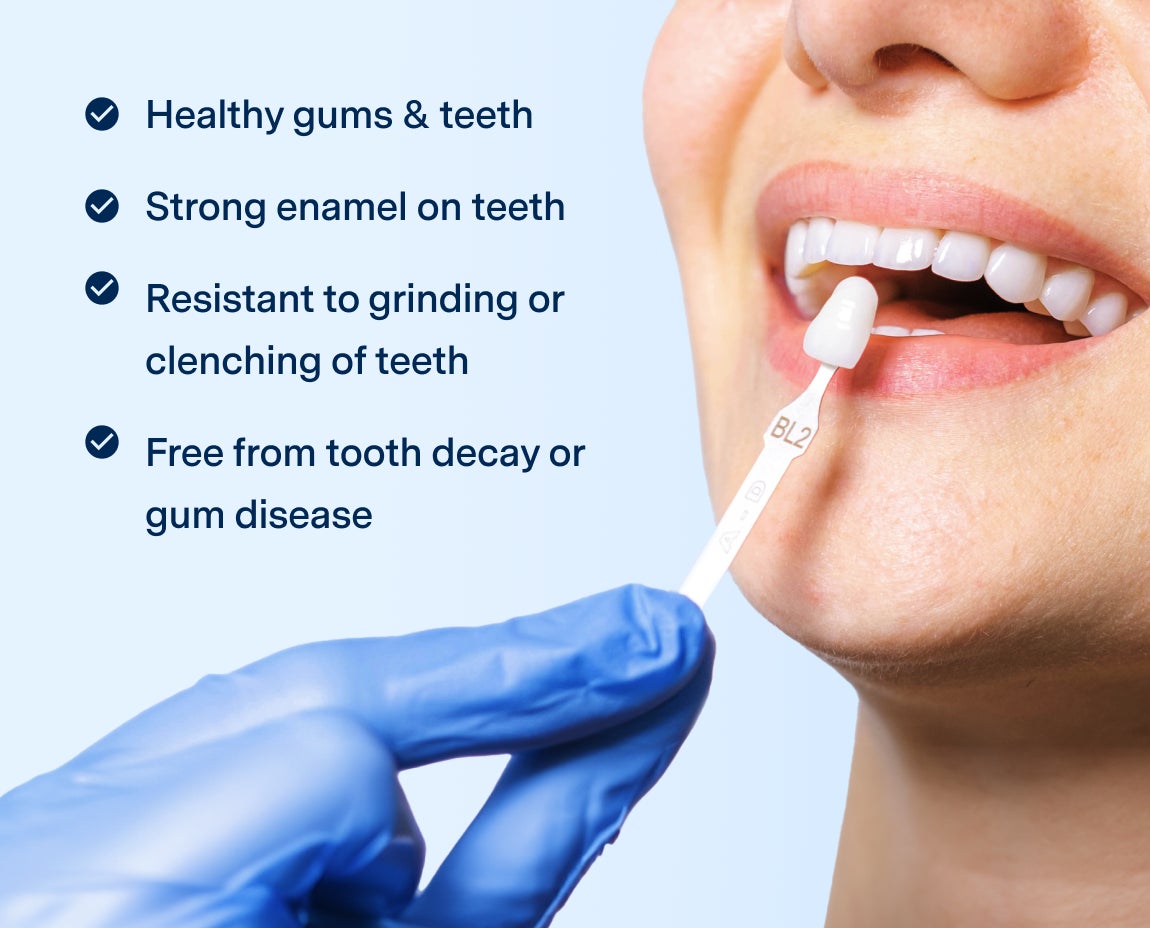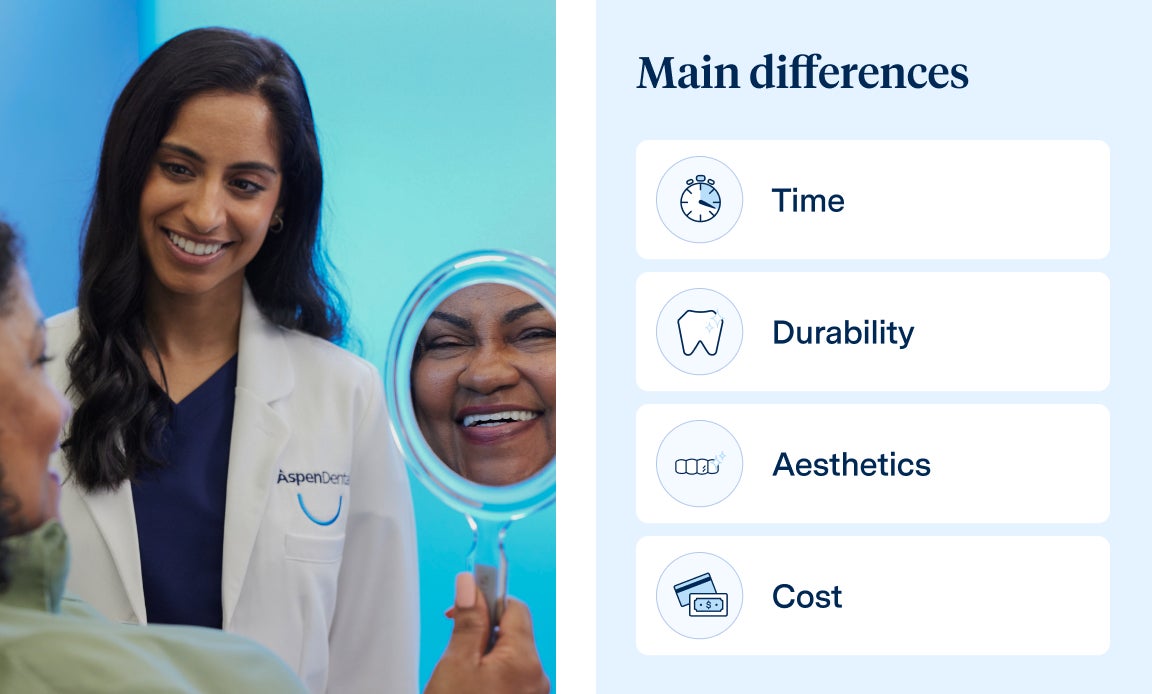Composite vs porcelain veneers: Which material is best for you?
Choose the right veneers for your smile! Compare composite and porcelain veneer options with guidance from Aspen Dental.

A perfect smile can boost your confidence and leave a lasting impression. Dental veneers can help you achieve that brilliant smile you’ve always dreamed of, and deciding to get veneers is the first step towards it. But which type should you choose? The two most popular options are composite veneers and porcelain veneers. Let's explore the differences, benefits and how to make the best choice for your smile.
Who is eligible for dental veneers?
Dental veneers aren't suitable for everyone, so it's important to know if you meet the criteria. Generally, candidates for veneers should have healthy gums and teeth. They should be free from tooth decay or gum disease and have enough enamel on their teeth to support the veneers. Those who frequently grind or clench their teeth may need to discuss alternatives with their dentist, as these habits can damage veneers.

Types of veneers
With advancements in dental technology, veneers have evolved over time leading to different types of veneers available to consider. The most common types today are composite and porcelain veneers.

Composite veneers
Composite veneers, also known as bonding or same-day veneers, are made from a tooth-colored resin. This resin is applied directly to the tooth surface and then shaped and polished to achieve the desired look. These veneers can be placed in just one visit. Here’s how it works:
The dentist roughens the tooth's surface and applies a conditioning liquid.
The composite resin is placed on the tooth and molded to the desired shape.
A special light is used to harden and set the composite material.
Finally, the veneer is polished for a natural appearance.

Porcelain veneers
Porcelain veneers are thin, custom-made shells bonded to the front of the teeth. These veneers are created in a dental laboratory and usually require two visits to complete:
During the first visit, the dentist prepares the teeth by removing a small amount of enamel and taking impressions of your teeth.
The impressions are sent to a lab where the veneers are crafted.
During the second visit, the dentist bonds the veneers to your teeth using a special adhesive.

Pros and cons of composite veneers and porcelain veneers
Let's break down the advantages and disadvantages of each type of veneer in more detail to help you make a more informed decision.
Pros of composite veneers
Cost-effective
Generally cheaper than porcelain veneers. With a lower initial investment, composite veneers can be appealing for those on a tight budget or looking for a temporary solution while considering more long-term options.
Quick procedure
Can be completed in one visit. This single appointment format means minimal disruption to your schedule, making it ideal for individuals looking to enhance their smile quickly.
Reversible
Minimal preparation means they can be removed if needed. Unlike porcelain, which requires significant alteration of the tooth structure, composite veneers allow you to keep more of your natural enamel intact.
Cons of composite veneers
Durability
Less durable than porcelain, typically lasting 5-7 years. While they are less durable, proper care—such as avoiding hard foods and maintaining good oral hygiene—can help extend their lifespan.
Staining
More prone to staining from foods and drinks. While some staining can be addressed with professional cleaning, over time they may require replacement to restore their original appearance.
Less natural look
Not as translucent as porcelain, which may look less natural. Some individuals may notice a difference in appearance, especially in direct lighting where the translucency of natural teeth is more pronounced.
Pros of porcelain veneers
Durability
Can last 10-15 years with proper care. This longevity can make them a wise investment, particularly if you are looking for a long-term solution for achieving a beautiful smile.
Stain-resistant
Less likely to discolor. The non-porous nature of porcelain means that these veneers maintain their color and luster longer than composite options.
Natural appearance
Highly translucent, mimicking natural teeth. Porcelain veneers can be customized in color and shape, providing an unmatched aesthetic appeal that closely resembles your natural teeth.
Cons of porcelain veneers
Cost
More expensive than composite veneers. The higher investment reflects the material's durability and the labor-intensive process of creating custom veneers, which may not be accessible to everyone.
Multiple visits
Requires at least two dental appointments. The need for multiple visits can be a drawback for those seeking a quick solution. However, these visits ensure that the veneers are meticulously crafted for a perfect fit and appearance.
Irreversible
Requires more enamel removal, making the process permanent. Patients should carefully consider their options, as this permanent alteration to their tooth structure can have long-term implications.

The main differences in composite veneers vs porcelain veneers
Understanding the specific differences between composite and porcelain veneers can help you make an informed decision. Here are the key factors to consider in greater detail:
Time
Composite veneers are quicker to apply, often requiring just one visit. For those eager to improve their smile shortly, this makes composite veneers an appealing option. In contrast, porcelain veneers take longer, usually involving multiple visits and a wait time for the lab to create your custom veneers. This process allows for a better custom fit but requires patience.
Durability
Porcelain veneers are more durable and long-lasting, typically lasting 10-15 years. With the right care, which includes avoiding excessive force from biting or grinding teeth, they can retain their form and appearance for years. Composite veneers, while still durable, usually last 5-7 years and may require more frequent maintenance or replacement, making them less ideal for those looking for a long-term solution.
Aesthetics
Porcelain veneers offer a more natural and aesthetically pleasing appearance due to their translucent quality which closely mimics natural teeth. They can be color-matched to seamlessly blend with your existing teeth. Composite veneers, while effective, may not look as natural because they lack the same level of translucency. This may be especially noticeable in individuals with a desire for a smile that blends effortlessly with their current teeth.
Costs
Composite veneers are generally more affordable upfront, making them a popular choice for those on a budget. However, they may incur additional veneers costs over time due to their shorter lifespan, potentially leading to replacements sooner than expected. Porcelain veneers have a higher initial cost but can provide better long-term value due to their durability and reduced need for replacement.

Other things to consider
Are composite veneers always cheaper than porcelain veneers?
Yes, composite veneers are typically more affordable than porcelain veneers. However, the overall cost can vary depending on the dentist and specific circumstances.
When should I choose composite veneers over porcelain veneers and vice versa?
Composite veneers are a good option if you’re looking for a cost-effective solution and want a quick procedure. Porcelain veneers are better for those seeking a more durable and natural-looking result, even if it requires a higher upfront investment.
Is the way you recover after getting composite veneers different from how you recover after getting porcelain veneers?
The recovery process is similar for both types of veneers. You may experience some sensitivity and discomfort initially, but this usually subsides within a few days. Follow your dentist's aftercare instructions to ensure a smooth recovery.

Making the right choice
Ultimately, the best choice depends on your individual needs, preferences and budget. It’s essential to consult with Aspen Dental to discuss your options and determine which type of veneer is best suited for you. Remember, this decision will impact your appearance and confidence, so take the time to make an informed choice. We’re here for you to help you weigh your options.
Schedule an appointment with Aspen Dental to find veneers that work for you. Our experienced team is here to help you achieve the smile you’ve always dreamed of. Don't wait—take the first step towards a brighter smile today!
Schedule appointment >
